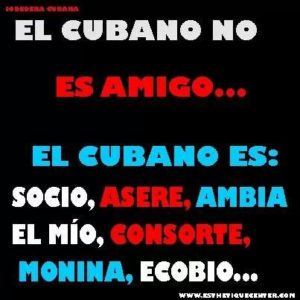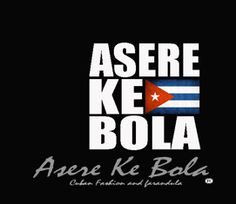The links between Africans, Spaniards and Indians are part of the Cuban nationality, but in the case of the voices used by the former, they have not always been well viewed and are subject to rejection, being considered from the slums and belonging to the delinquency ; And it is true that this is its true origin.
The racial prejudices inherited from the colonizers maintained these expressions as patrimony of the lower strata and especially of the blacks, and today many linguists criticize its use and label them uncultivated, but still Cubans have incorporated into the popular and informal speech an infinity of words Of that type.
Today we listen to young people and adults of any social and linguistic stratum say ambia, cúmbila, consorte, monina, nague or negue and asere, the latter the most pronounced and widespread among all is that the national poet Nicolás Guillén incorporated into our literature the language Of the black muzzles as something natural.
The term asere is a true carabali strain and not Yoruba or Lucumí as has been believed and was registered in 1961 in its present significance as a faithful friend, in the compilation “Cuban popular speech of today” by the journal Actas del Folklore and in The collection of cubichismos of the writer and journalist Argelio Santiesteban.
The term is not as new among Cubans as some people think, since in the 1930’s the bass player and conductor Estanislao Servía composed the danzón “Asere Cipriano” and in the novel “The Initials of the Earth”, from Jesus Diaz, the term appears, as a sample of its inclusion in written language.
Gonzalo Martín Vivaldi, professor and journalist from Granada who died in 1983 once and rightly raised. “The dictionary goes behind the tongue: it is a mirror where the saying of people is reflected. Do not create or invents, collect “, as manifested in the so resorted asere, typical of the natives of the Greater Antilles.
The first inhabitants of Cuba and the African slaves left us words that persist in our way of expressing ourselves, but to the rich island vocabulary are added others that are part of the jargon that we invent to diary, as it is the case of Which volá ?, that wants To say how are you? Or what, according to the intention of the speaker.
Now, the Cubans scattered throughout the planet, mostly in South Florida, also speak like this, as faithful exponents of the legacy of our ancestors, with the problem that the emigrants of other nations hardly understand us, when speaking the same language We say: Que volá asere? y la pura? y el curralo?
De ese idioma o “la jerga” que inventamos los cubanos. Asere que Volá!
Los vínculos entre africanos, españoles e indígenas forman parte de la nacionalidad cubana, pero en el caso de las voces utilizadas por los primeros no siempre han sido bien vistas y están sujetas al rechazo, por ser consideradas de los barrios marginales y pertenecer a la delicuencia; y es cierto que esa es su verdadera procedencia.
Los prejuicios raciales heredados de los colonizadores mantuvieron esas expresiones como patrimonio de las capas bajas y en especial de los negros y actualmente muchos linguistas critican su empleo y las catalogan incultas, pero aún así los cubanos hemos incorporado al habla popular e informal una infinidad de palabras de ese tipo.
Hoy escuchamos a jóvenes y adultos de cualquier estrato social y linguístico decir ambia, cúmbila, consorte, monina, nague o negue y asere, esta última las más pronunciada y difundida entre todas y es que el poeta nacional Nicolás Guillén incorporó a nuestra literatura la lengua de los negros bozales como algo natural.
El término asere es de auténtica estirpe carabalí y no Yoruba o Lucumí como se ha dado a creer y fue registrado en 1961 en su presente significación como amigo fiel, en la compilación “Habla popular cubana de hoy“ de la revista Actas del Folklore y en la colección de cubichismos del escritor y periodista Argelio Santiesteban.
El vocablo no es tan nuevo entre los cubanos como algunos pìensan, ya que en la década del 30 el contrabajista y director de orquesta Estanislao Servía, compuso el danzón “Asere Cipriano“ y en la novela “Las Iniciales de de la Tierra“, de Jesús Díaz, aparece el término, como muestra de su inclusión en el lenguaje escrito.
Gonzalo Martín Vivaldi, catedrático y periodista granadino fallecido en 1983 planteó en una ocasión y con razón. “El diccionario va detrás de la lengua: es un espejo donde se refleja el decir de la gente. No crea ni inventa, recolecta“ , como se manifiesta en el tan recurrido asere, propio de los oriundos de la mayor de las Antillas.
Los primeros habitantes de Cuba y los esclavos africanos nos dejaron palabras que persisten en nuestra forma de expresarnos, pero al rico vocabulario isleño se suman otras que forman parte de la jerga que inventamos a díario, como es el caso de Qué volá?, que quiere decir cómo estás? o qué pasa?, según la intención del parlante.
Ahora bien, los cubanos desperdigados por el planeta, en mayoría en el sur de la Florida, también hablamos así, como fieles exponentes del legado de nuestros ancestros, con la problemática que los emigrantes de otras naciones apenas nos entienden, cuando hablando el mismo idioma decimos: Que volá asere? y la pura? y el curralo?
Agencies/Arrajatabla/Alberto Denis/Extractos/Internet Photos/ Arnoldo Varona/ TheCubanHistory.com
THE CUBAN HISTORY, HOLLYWOOD.







